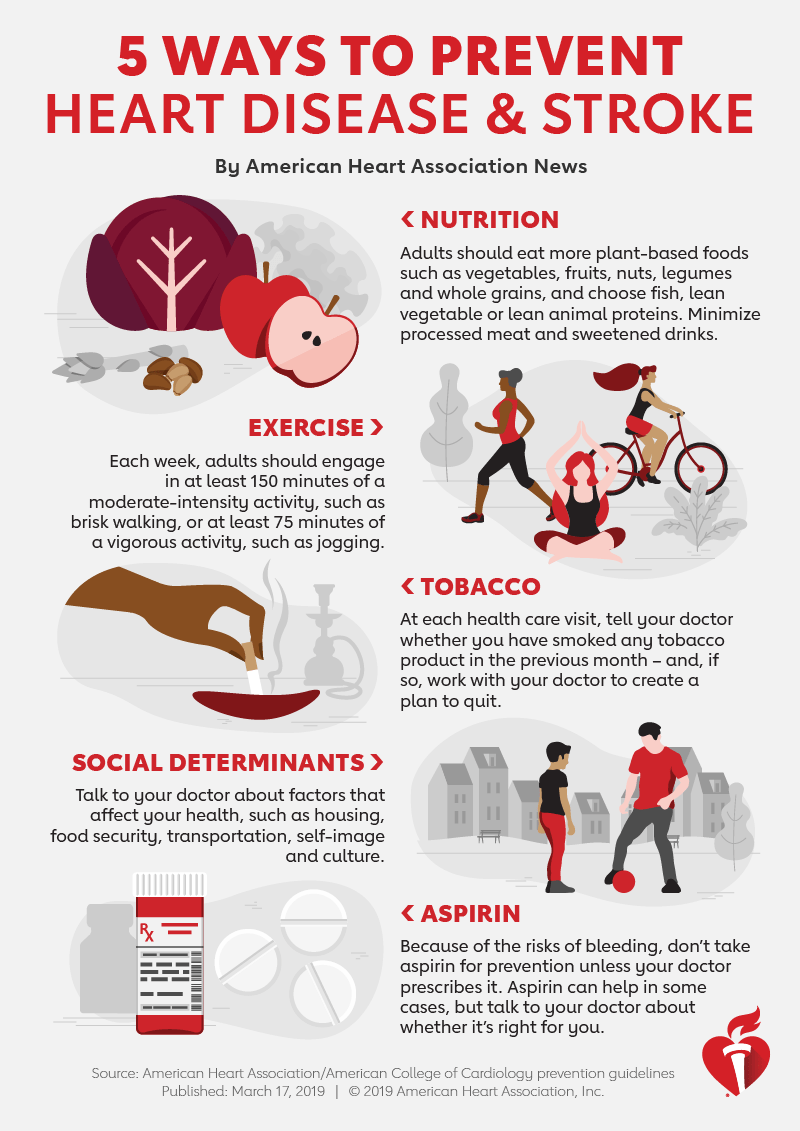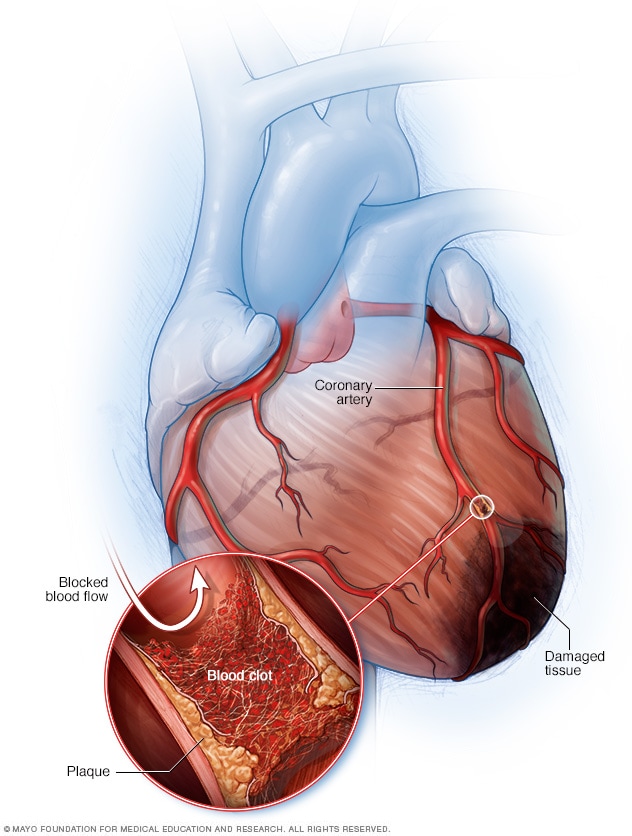Heart Attack
-
Heart attack
A heart attack occurs when the flow of blood to the heart is blocked. The blockage is most often a buildup of fat, cholesterol, and other substances, which form a plaque in the arteries that feed the heart (coronary arteries).
The plaque eventually breaks away and forms a clot. The interrupted blood flow can damage or destroy part of the heart muscle.
A heart attack, also called a myocardial infarction, can be fatal, but treatment has improved dramatically over the years. It's crucial to call 911 or emergency medical help if you think you might be having a heart attack.
Symptoms
Common heart attack signs and symptoms include:
- Pressure, tightness, pain, or a squeezing or aching sensation in your chest or arms that may spread to your neck, jaw or back
- Nausea, indigestion, heartburn or abdominal pain
- Shortness of breath
- Cold sweat
- Fatigue
- Lightheadedness or sudden dizziness
When to see a doctor
Act immediately. Some people wait too long because they don't recognize the important signs and symptoms. Take these steps:
- Call for emergency medical help. If you suspect you're having a heart attack, don't hesitate. Immediately call 911 or your local emergency number. If you don't have access to emergency medical services, have someone drive you to the nearest hospital.Drive yourself only if there are no other options. Because your condition can worsen, driving yourself puts you and others at risk.
- Take nitroglycerin, if prescribed to you by a doctor. Take it as instructed while awaiting emergency help.
- Take aspirin, if recommended. Taking aspirin during a heart attack could reduce heart damage by helping to keep your blood from clotting.Aspirin can interact with other medications, however, so don't take an aspirin unless your doctor or emergency medical personnel recommend it. Don't delay calling 911 to take an aspirin. Call for emergency help first.
What to do if you see someone who might be having a heart attack
- If you see someone who's unconscious and you believe is having a heart attack, first call for emergency medical help. Then check if the person is breathing and has a pulse. If the person isn't breathing or you don't find a pulse, only then should you begin CPR to keep blood flowing.
- Push hard and fast on the person's chest in a fairly rapid rhythm — about 100 to 120 compressions a minute.
- If you haven't been trained in CPR, doctors recommend performing only chest compressions. If you have been trained in CPR, you can go on to opening the airway and rescue breathing.
Causes
A heart attack occurs when one or more of your coronary arteries become blocked. Over time, a coronary artery can narrow from the buildup of various substances, including cholesterol (atherosclerosis). This condition, known as coronary artery disease, causes most heart attacks.
During a heart attack, one of these plaques can rupture and spill cholesterol and other substances into the bloodstream. A blood clot forms at the site of the rupture. If large enough, the clot can block the flow of blood through the coronary artery, starving the heart muscle of oxygen and nutrients (ischemia).
You might have a complete blockage or partial. A complete blockage means you've had an ST-elevation myocardial infarction (STEMI). A partial blockage means you've had a non-ST elevation myocardial infarction (NSTEMI). Diagnostic steps and treatment might be different depending on which you've had.
Another cause of a heart attack is a spasm of a coronary artery that shuts down blood flow to part of the heart muscle. Using tobacco and illicit drugs, such as cocaine, can cause a life-threatening spasm.
Risk factors
Certain factors contribute to the unwanted buildup of fatty deposits (atherosclerosis) that narrows arteries throughout your body. You can improve or eliminate many of these risk factors to reduce your chances of having a first or another heart attack.
Heart attack risk factors include:
- Age. Men of age 45 or older and women age 55 or older are more likely to have a heart attack than are younger men and women.
- Tobacco. This includes smoking and long-term exposure to secondhand smoke.
- High blood pressure. Over time, high blood pressure can damage arteries that feed your heart. High blood pressure that occurs with other conditions, such as obesity, high cholesterol or diabetes, increases your risk even more.
- High blood cholesterol or triglyceride levels. A high level of low-density lipoprotein (LDL) cholesterol (the "bad" cholesterol) is most likely to narrow arteries. A high level of triglycerides, a type of blood fat related to your diet, also ups your risk of a heart attack. However, a high level of high-density lipoprotein (HDL) cholesterol (the "good" cholesterol) lowers your risk of a heart attack.
- Obesity. Obesity is associated with high blood cholesterol levels, high triglyceride levels, high blood pressure, and diabetes. Losing just 10 percent of your body weight can lower this risk, however.
- Diabetes. Not producing enough of a hormone secreted by your pancreas (insulin) or not responding to insulin properly causes your body's blood sugar levels to rise, increasing your risk of a heart attack.
- Metabolic syndrome. This occurs when you have obesity, high blood pressure, and high blood sugar. Having metabolic syndrome makes you twice as likely to develop heart disease than if you don't have it.
- Family history of a heart attack. If your siblings, parents or grandparents have had early heart attacks (by age 55 for male relatives and by age 65 for female relatives), you might be at increased risk.
- Lack of physical activity. Being inactive contributes to high blood cholesterol levels and obesity. People who exercise regularly have better cardiovascular fitness, including lower high blood pressure.
- Stress. You might respond to stress in ways that can increase your risk of a heart attack.
- Illicit drug use. Using stimulant drugs, such as cocaine or amphetamines, can trigger a spasm of your coronary arteries that can cause a heart attack.
- A history of preeclampsia. This condition causes high blood pressure during pregnancy and increases the lifetime risk of heart disease.
- An autoimmune condition. Having a condition such as rheumatoid arthritis or lupus can increase your risk of a heart attack.
Complications
Complications are often related to the damage done to your heart during an attack, which can lead to:
- Abnormal heart rhythms (arrhythmias). Electrical "short circuits" can develop, resulting in abnormal heart rhythms, some of which can be serious, even fatal.
- Heart failure. An attack might damage so much heart tissue that the remaining heart muscle can't pump enough blood out of your heart. Heart failure can be temporary, or it can be a chronic condition resulting from extensive and permanent damage to your heart.
- Sudden cardiac arrest. Without warning, your heart stops due to an electrical disturbance that causes an arrhythmia. Heart attacks increase the risk of sudden cardiac arrest, which can be fatal without immediate treatment.
Prevention
It's never too late to take steps to prevent a heart attack — even if you've already had one. Here are ways to prevent a heart attack.
- Medications. Taking medications can reduce your risk of a subsequent heart attack and help your damaged heart function better. Continue to take what your doctor prescribes, and ask your doctor how often you need to be monitored.
- Lifestyle factors. You know the drill: Maintain a healthy weight with a heart-healthy diet, don't smoke, exercise regularly, manage stress and control conditions that can lead to heart attacks, such as high blood pressure, high cholesterol, and diabetes.


Comments
Post a Comment